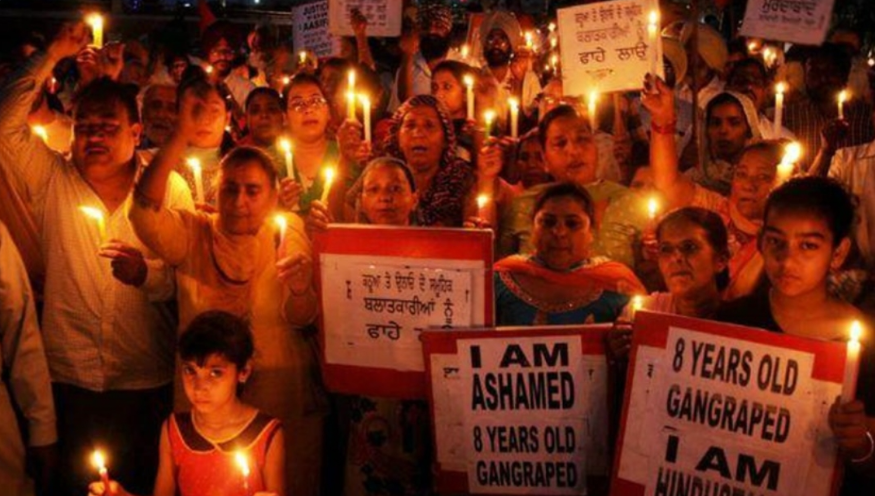Rising Rape Crimes in India: An Urgent Call for Action (GS Paper 2, Governance)

Context
- The alarming rise in rape crimes across India has intensified calls for comprehensive legal reforms and societal change to address the pervasive issue of sexual violence.
- These incidents have prompted demands for harsher penalties, including the death penalty for perpetrators, and the urgent need to create a safer environment for women.
Legal Framework Regarding Rape in India
Definition and Types of Rape
Under the Bharatiya Nyaya Sanhita (BNS), 2023, rape is defined as non-consensual sexual intercourse, particularly emphasizing circumstances involving coercion, deception, or the victim being underage or unable to consent.
Key types include:
- Aggravated Rape: Committed by individuals in positions of authority over the victim.
- Gang Rape: Involves multiple assailants.
- Marital Rape: The forced sexual intercourse between spouses without mutual consent.
Laws Governing Rape
- Bharatiya Nyaya Sanhita, 2023: This new legislation replaces the colonial-era IPC and introduces harsher punishments for aggravated forms of rape, including gang rape.
- Criminal Law (Amendment) Act, 2013: Responding to the Nirbhaya case, this law increased minimum sentences and introduced stricter penalties for heinous crimes.
- Protection of Children from Sexual Offences (POCSO) Act, 2012: This act safeguards children from sexual offenses.
Rights of Rape Victims
- Zero FIR: Victims can file FIRs at any police station, ensuring immediate action.
- Free Medical Treatment: Hospitals are mandated to provide free medical care to survivors.
- No Two-Finger Test: This practice has been banned to uphold the dignity of victims.
- Compensation: The National Legal Services Authority provides compensation for survivors.
Factors Behind the Increase in Rape Cases
Societal Norms and Attitudes
- Normalization of Rape: A culture that trivializes sexual violence and perpetuates victim-blaming has emerged.
- Victim Blaming: Cultural attitudes often place responsibility on survivors, deterring them from reporting incidents.
- Misogyny in Media: The portrayal of women in films and media often objectifies them, reinforcing harmful stereotypes.
Contributing Factors
- Alcoholism: Substance abuse can lead to increased aggression and violence.
- Gender Imbalance: The skewed sex ratio fosters an environment conducive to sexual violence.
- Insufficient Female Representation in Law Enforcement: The lack of female officers hampers victims' comfort in reporting crimes.
Challenges in Conviction Rates
Low Conviction Rates
Despite thousands of reported cases, the conviction rates for rape hover around 27-28%. This is attributed to:
- Systemic Issues: Corruption and inefficiency within law enforcement can lead to mishandled cases.
- Socio-Cultural Factors: Victims often face societal stigma and pressure, discouraging them from pursuing justice.
- Inconsistent Law Enforcement: Varying applications of laws across jurisdictions undermine accountability.
Examples of Failures
- The Hathras case and the Nirbhaya case illustrate significant lapses in police response and judicial delays, demonstrating systemic weaknesses in addressing sexual violence.
Implications of Rising Rape Cases
Societal Impact
- Restrictions on Women: Increased violence curtails women's freedom and mobility.
- Workplace Dynamics: Concerns about safety may deter women from participating in the workforce.
- Economic Consequences: The financial burden of medical treatment and psychological support for survivors strains healthcare resources.
Reinforcement of Gender Stereotypes
- The prevalence of rape contributes to harmful stereotypes and perpetuates gender inequality, limiting women's opportunities in various spheres.
Way Forward
Legal and Policy Reforms
- Efficiency Over Severity: Focus on improving the efficiency of the judicial process rather than merely increasing penalties.
- Implement Justice Verma Recommendations: Many suggested reforms, including the criminalization of marital rape, remain unaddressed.
Changing Societal Attitudes
- Education and Awareness: Initiatives to promote understanding of consent and respectful behavior are essential.
- Media Responsibility: Regulating the portrayal of women in media to prevent objectification.
Support Systems for Victims
- Mental Health and Legal Aid: Establishing comprehensive support services for survivors can facilitate their recovery and pursuit of justice.
Conclusion
- Rape is a grave violation of human rights that undermines societal safety and values.
- While India’s legal framework aims to protect victims, substantial challenges remain.
- To foster a safer environment, it is crucial to rigorously enforce laws, promote education, and transform societal attitudes toward sexual violence.
- Ensuring justice for survivors and holding perpetrators accountable is vital for a just and secure society for all women.


